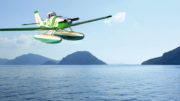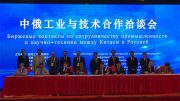No politics, I said in my chronicle of March 13, although some will say that I am going back on my word this week. Not so. It is more a question of pointing out the potential difficulties facing all industrial sectors and specifically the aeronautics and space industry.
First off: Bombardier. The Canadian manufacturer had envisaged building part of its Dash8-Q400 aircraft in partnership with Russian state enterprise Rostec, but the project has been put on hold because of Canadian government sanctions against Russia. Collateral damage of the Ukrainian crisis and the annexing of Crimea by Russia. According to the Bloomberg agency, this decision could have a positive outcome for Europe since Russia might choose Airbus as a partner. Not so fast! Russia has no intention of lagging behind.
Without wishing to draw up an exhaustive list, it is clear that all major industrialists have interests in Russia. Boeing and Airbus both have vested interests in this country in the form of cooperative links with metallurgists in R & D or engineering centres. Idem for Safran, in the area of materials and also as a partner in the SSJ100 programme, mainly for engines and other equipment. Then there is Liebherr Aerospace which in 2011 inaugurated a production centre for detail parts (which actually supplies all branches of the Liebherr group). And what will become of smaller structures such as the Breton SME Le Guellec which signed a contract in 2008 for the supply of tube heat exchangers to Russian firm MMPP Salut? A contract that at the time represented an annual market of 145,000 euros?
And these are only the tip of the iceberg.
Other key aeronautics industrialists must be concerned about their ongoing partnerships with firms which, although neither Ukrainian nor Russian, could nonetheless be compromised by Russia.
Because the latter, abandoned by the European Union and the United States (the cancellation of the G8 summit at Sochi sounded the death knell of this “club of world economic powers”), is shifting its international co-operation Eastwards, as reported by the Ria Novosti agency, quoting the Vedomosti daily newspaper. One might be justified in asking the question: “How feasible is this Russian policy and what would be the advantages of such co-operation with Russia? Would they outweigh the benefits of co-operation with the West and participation in the world economy? »
Because if Russia looks to the East, to the countries of the Commonwealth of Independent States(CIS), there is a very real risk of their attachment to the federation of Russia. One can see this at work in Crimea, which of course used to belong to one of them, Ukraine.
And in this case, what of partnerships engaged with such countries? The joint factory built by Aubert & Duval and its partner UST-Kamenogorsk Titanium and Magnesium Seedling (UKTMP), for instance, is located close to the Aubert & Duval plant in the Auvergne commune of Saint-Georges-de-Mons (Puy-de-Dôme), but the raw material going to make up rods, billets, wires and heavy titanium sheet comes from the Kazakh factory of UKTMP in the North-East of Kazakhstan.
And what about space activities? Admittedly Europe and France have built a launching pad for the Russian launcher Soyuz in French Guyana, but that does not mean that Russia has lost interest in this launcher. In December 2013, from the single launch pad (out of four) in service on the Plesetsk base in Russia, the country under Putin’s iron hand successfully tested a launcher derived from the Soyuz 2. These rockets can also be launched from Baïkonour in Kazakhstan which has two launching pads, while Russia has even, in its will to remain master of Soyuz launchings, engaged in the construction of an eighth launch pad on the new cosmodrome at Vostotchni in Russia.
In this geopolitical context, will we Europeans succeed in preserving hard fought contracts for the supply of spy satellites to Russia?
Nicole Beauclair – AeroMorning
(Translated by L. Jones)














Be the first to comment on "Russian alert for the Western supply-chain"